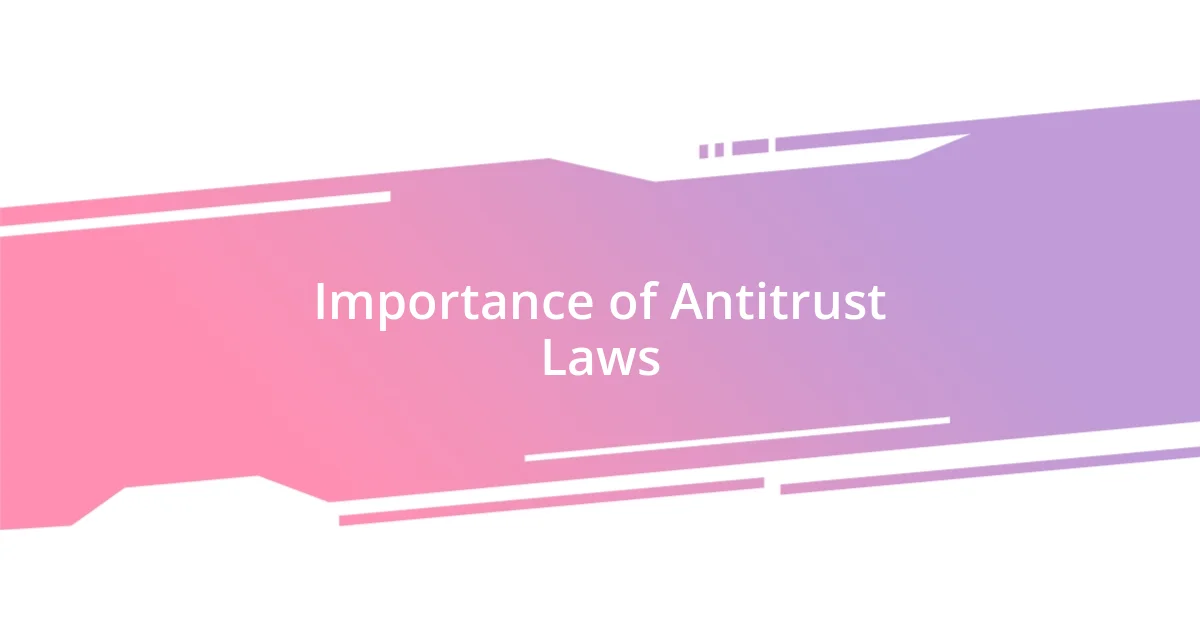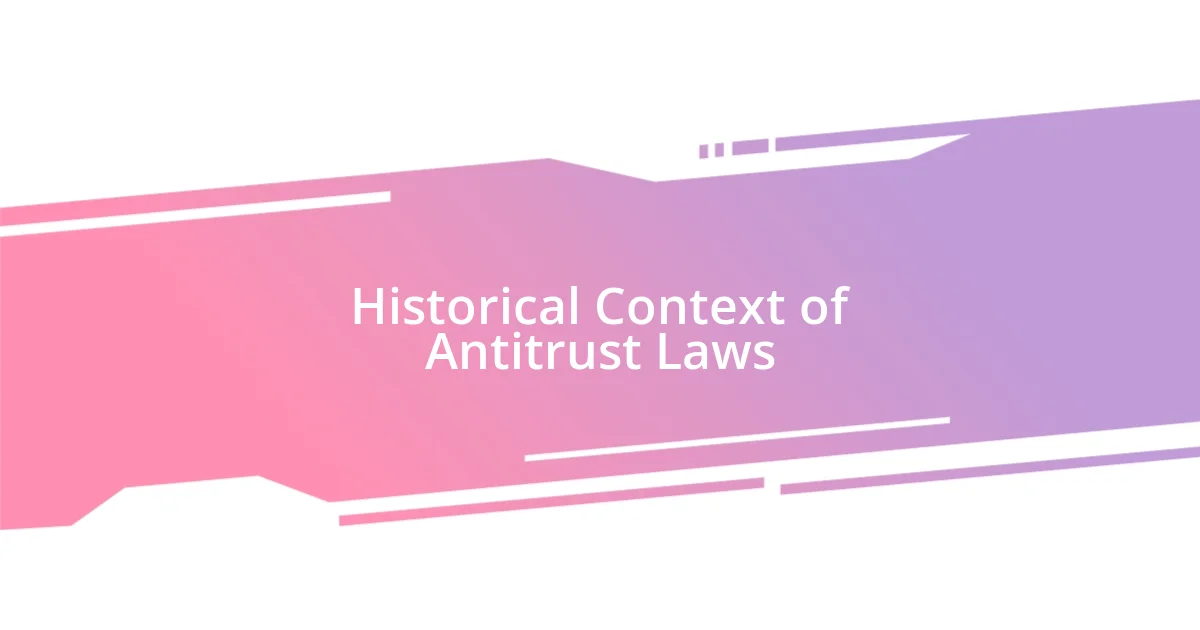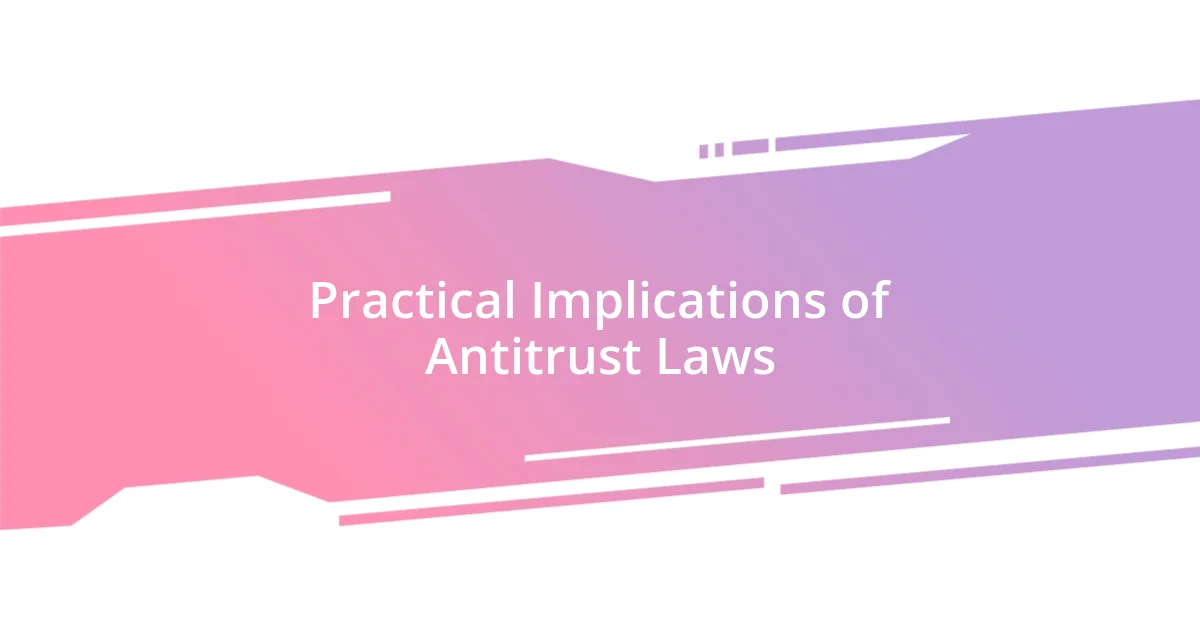Key takeaways:
- Antitrust laws were established to promote competition, protect consumer welfare, and prevent monopolies, with significant historical milestones like the Sherman Antitrust Act of 1890 and the Clayton Antitrust Act of the 1930s.
- Key cases such as U.S. v. Microsoft and the AT&T breakup highlight the importance of antitrust enforcement in fostering innovation and maintaining market balance, benefiting consumers across various industries.
- Practical implications of these laws underscore the necessity for compliance training, robust review processes, and transparency in business practices to encourage fair competition and safeguard consumer interests.

Understanding Antitrust Laws Basics
Antitrust laws are designed to promote competition and prevent monopolies or unfair business practices. I remember when I first encountered the concept of monopolies in my economics class; it sparked my curiosity about how these laws shape the marketplace. Have you ever noticed how a single company dominates an entire sector? That’s where antitrust laws step in, ensuring a level playing field for all businesses.
At the core of antitrust laws lies the protection of consumer welfare. I often think about how these laws impact my daily choices, from the variety of products available to pricing fairness. When I see several brands competing for my attention, I’m reminded that this vibrant marketplace is a direct result of legal frameworks that prevent any one entity from stifling competition.
Moreover, understanding antitrust laws also means grappling with concepts like price-fixing or collusion, where companies might work together to set prices. I recall a recent discussion with friends about a blatant case in the tech industry, and it made me wonder: how often do we unknowingly support businesses that could be engaging in such practices? It’s a crucial reminder of why being informed about these laws isn’t just for lawyers—it’s important for every consumer.

Importance of Antitrust Laws
Antitrust laws play a vital role in fostering innovation and protecting consumers. I still vividly remember a time when a tech startup I was rooting for struggled to gain traction due to a giant corporation’s aggressive tactics. It was disheartening to see a promising idea faced with such overwhelming odds. This experience highlighted for me that without effective antitrust regulations, the creativity and ingenuity of smaller companies could be overshadowed, leaving consumers with fewer choices and stifled progress.
Here are some key benefits of antitrust laws:
- Enhanced Competition: They create an environment where businesses can compete fairly, leading to better products and services for consumers.
- Consumer Protection: By preventing monopolies, these laws safeguard consumers from inflated prices and limited options.
- Encouragement of Innovation: A competitive market fuels innovation, as companies strive to improve and differentiate their offerings.
- Market Stability: They help maintain a balanced market, preventing shifts that could disrupt economic stability.
Reflecting on these points, I realize that each benefit encapsulates a piece of what makes our economy vibrant. I often marvel at how this delicate balance of competition nurtures creativity while protecting our interests as consumers.

Key Antitrust Law Concepts
Antitrust laws are grounded in several key concepts that help maintain fair competition. One critical aspect is the prohibition of monopolistic practices. I remember talking with a friend who worked at a small coffee shop. She often brought up how larger chains like Starbucks could push smaller local businesses to the brink by pricing their products ridiculously low just to capture the market. These conversations got me thinking about how antitrust laws protect those very businesses, ensuring they have the space to thrive amidst larger competitors.
Another fundamental concept is the distinction between horizontal and vertical agreements. Horizontal agreements occur between competing firms, like when two companies decide to fix prices. I once read about a scandal involving airlines colluding on ticket prices, which made my blood boil. On the other hand, vertical agreements involve companies at different stages of production; for example, a manufacturer might control a distributor’s prices. Understanding these distinctions helped me to see the varied situations antitrust laws cover, allowing for a more nuanced perception of market dynamics.
Lastly, the concept of market power is vital when discussing antitrust laws. I recall a professor who frequently emphasized how companies with substantial market power could manipulate prices at will, ultimately hurting consumers. This perspective shifted my focus to how antitrust regulations actively counter such behavior, striving to ensure no single company can dictate market terms.
| Key Concepts | Description |
|---|---|
| Monopoly Prohibition | Prevents single entities from dominating a market, fostering competition. |
| Horizontal vs. Vertical Agreements | Horizontal agreements involve competitors, while vertical agreements occur between different production stages. |
| Market Power | Refers to a company’s ability to manipulate prices and market conditions. |

Historical Context of Antitrust Laws
During the late 19th century, the rapid industrialization of the United States gave rise to massive corporations known as trusts, which began to dominate entire industries. I think back to when I first learned about Standard Oil’s tactics to undercut local refineries, and it sparked an emotional response within me—how could one company wield such power over so many? This period of unchecked consolidation raised voices advocating for fair competition, leading to the enactment of the Sherman Antitrust Act in 1890, the first federal legislation to curb monopolistic practices.
As I delved deeper into the origins of antitrust laws, I couldn’t help but appreciate the historical battles that shaped them. Take the early 20th century, for instance, when President Theodore Roosevelt, known as the “Trust Buster,” took bold steps to dismantle powerful monopolies. I remember reading about the landmark case against Northern Securities Company and feeling a sense of hope that we could achieve balance in the market. This era reinforced the belief that government intervention was necessary to protect consumers and promote a competitive business environment.
Fast forward to the 1930s, and the introduction of the Clayton Antitrust Act refined the landscape further by addressing specific issues like price discrimination and exclusive dealings. Reflecting on these developments, I realize how they laid the groundwork for a fairer economy. It’s fascinating to consider: without these historical precedents, where might we be today? Each legislative milestone underscores the ongoing struggle to balance corporate power with public interests, reminding me that the journey toward equitable competition is far from over.

Major Antitrust Case Studies
A notable case that often comes to mind is the U.S. v. Microsoft Corporation in the late 1990s. I recall reading about how Microsoft was accused of using its dominance in the operating system market to stifle competition in the web browser sector. It was shocking to see how a company could possibly steer an entire industry, almost like a puppet master manipulating its strings. This case highlighted the aggressive tactics that can arise in tech and prompted me to consider how influential such companies can shape our daily digital experiences.
Then there’s the infamous AT&T breakup in the 1980s. As I dug into this, I learned that the U.S. government took legal action against the telecommunications giant, aiming to dismantle its monopolistic structure. I remember discussing with friends how this monumental decision actually increased competition and innovation in the telecom industry, eventually leading to better services and lower prices for consumers. It was an inspiring example of how antitrust actions can have far-reaching positive effects, and I caught myself wondering, wouldn’t it be exciting to see more cases like this today?
One case that often gets overlooked is the FTC’s actions against the large pharmaceutical company, Bristol-Myers Squibb, in the early 2000s. I remember feeling a wave of anger when I discovered they were accused of using patent settlements to keep generic drugs off the market longer than necessary. This brought home the point that antitrust laws are not only about big tech or telecoms; they play a critical role in ensuring healthcare remains accessible. It made me reflect on our collective responsibility to keep these systems in check because, at the end of the day, consumer welfare should always come first.

Practical Implications of Antitrust Laws
Understanding the practical implications of antitrust laws can truly reshape how we interact with the market. For instance, when I first joined the workforce, I witnessed firsthand how a small startup struggled to thrive amidst the monopolistic grip of larger corporations. It struck me how antitrust laws are not just legal jargon but real tools that can empower smaller players to compete, fostering innovation and choice in the marketplace. Have you ever thought about how these regulations could change the landscape for new businesses today?
Moreover, I often reflect on how antitrust laws directly impact consumer prices and choices. When I bought my first home, I was surprised to learn how critical competition is in sectors like real estate and home services. It’s clear that when monopolies hold sway, prices can inflate unjustly, diminishing our options. This realization made me appreciate the ongoing need for vigilant enforcement of these laws to protect consumers, ensuring we don’t pay more simply because a few companies monopolize the market.
Additionally, in my advocacy work, I’ve seen the ramifications of weak antitrust enforcement. I remember attending a community meeting where a local business owner shared their struggles against predatory pricing practices. As I listened, it became painfully evident how essential these laws are in fostering fair competition and protecting not just businesses but entire communities. It makes one wonder—what could our local economies look like with stronger antitrust protections in place? The answer feels like a call to action for us all.

Steps to Comply with Antitrust Laws
One effective step to comply with antitrust laws is to conduct regular antitrust compliance training for your team. Early in my career, I participated in a workshop focused on these laws, and it was enlightening to see how easily misunderstandings can occur in a business environment. It made me realize that fostering a culture of awareness can help prevent infractions before they arise.
Additionally, I believe companies should implement a robust review process for partnerships and pricing strategies. I remember when my organization was about to enter a joint venture; we took the time to engage legal counsel to review the potential complexities. This proactive approach not only safeguarded us from potential legal issues but also instilled a sense of confidence that we were operating fairly and ethically.
Lastly, maintaining transparency in business dealings is crucial. I’ve seen how openly sharing information about pricing and market strategies can reinforce trust among competitors. When I attended industry networking events, I was surprised by how discussing these insights publicly fostered collaboration rather than rivalry. It made me ponder: isn’t it fascinating how transparency can be a powerful ally in promoting compliance with antitrust laws?













